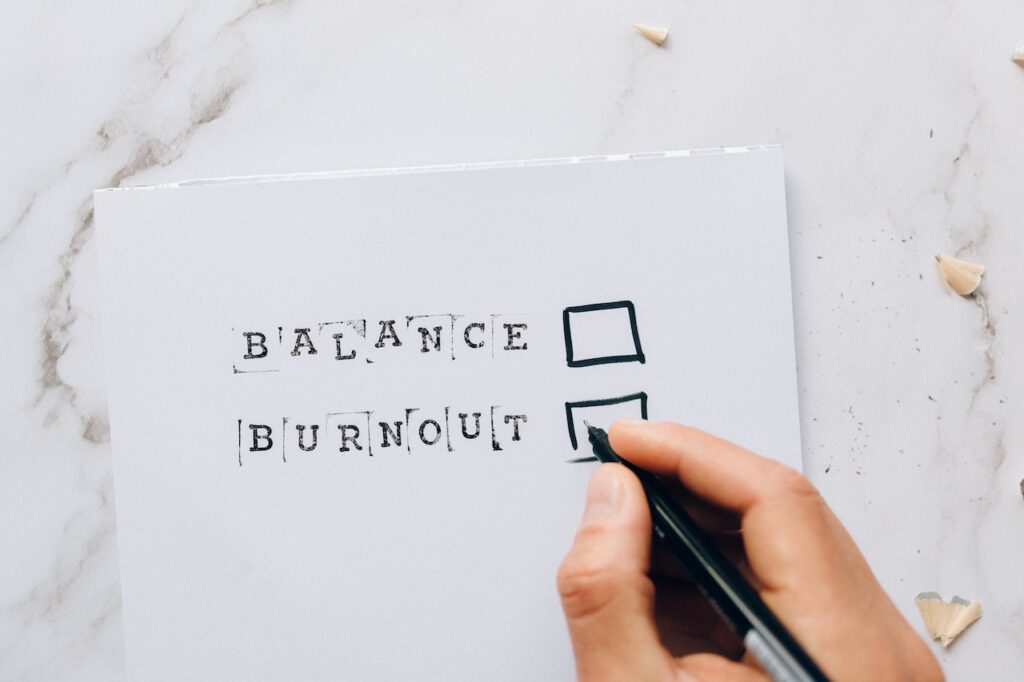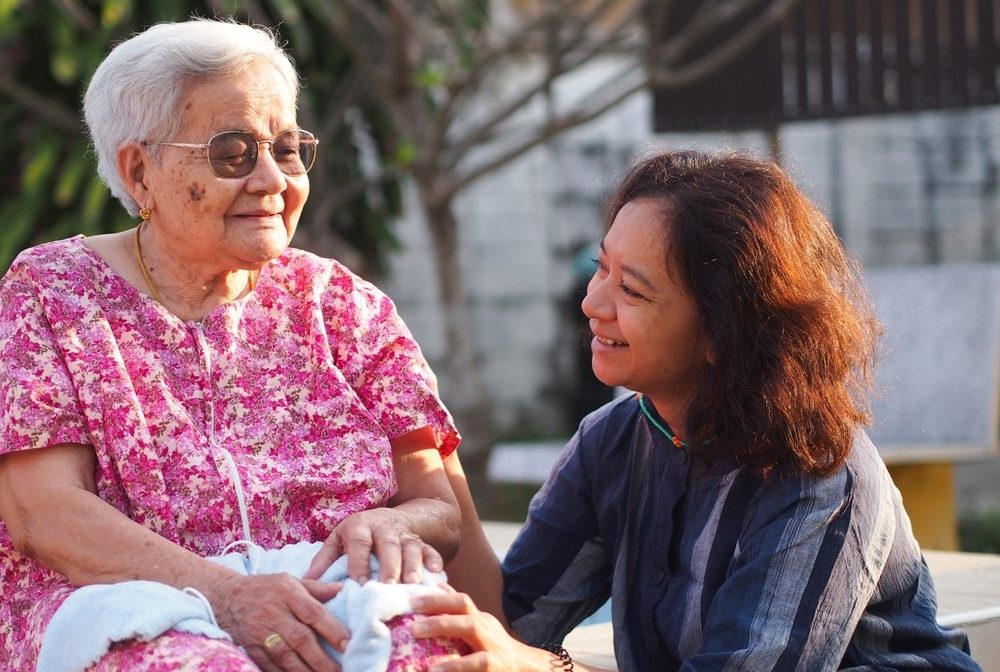
Few people need a definition of burnout these days. Most of us already know what it feels like to be on complete overload – often when there are still a ton of things that need to be done.
Burnout is tough. It’s exhausting and overwhelming, especially for caregivers.
It’s tough because the support systems we need simply don’t exist. Our modern world can even act like a burnout trap, making everything worse.
Sometimes it’s almost impossible to get any rest at all. There are constant demands to deal with – from regular life and from supporting an aging loved one.
Even families that can afford to hire caregivers periodically find that they don’t get as much relief as they expect. As Ilene Nathanson highlights, paid caregivers still require a lot of management and they don’t do everything.
Sure, there are options like respite for caregivers. But, these don’t give you much of a break at all, even when you can access them.
The minimal support means that once you are burned out, finding you way back to normal may feel impossible. How do you rest and feel better when the demands of caregiver are still there? Those demands might even be increasing.
It’s also tough because many caregivers don’t feel like they should be tired or that they shouldn’t give in to the tiredness.
Perhaps you’re the only person on hand to support your loved one. Or, perhaps you’re the only one who really understands (watch out for this pattern of thinking).
It may even seem like you should be able to do it. After all, so many people do much worse, right? They keep going, so you should be able to too.
It’s easy to think that the problem is you. That you’re getting something wrong. That it’s just a matter of finding the right strategies. Reading the right self-help book. Getting stronger, more resilient.
Yet, there’s so much more at play.
How The Modern World Makes Everything Worse
Traditional definitions associate burnout with helping professions. But, a growing number of authors talk about burnout as a side effect of modern society.
Books like Tired as F*ck and Can’t Even highlight this issue with blistering honesty.
The short story is that modern society promotes the idea that we should always be doing things. That there’s an inherent goodness and value in being productive. People cheer when we have a lot on our plate, when we’re busy, even if that busyness isn’t helping us at all.
This pattern easily means that some of our to-dos are things we feel we ‘should’ do, rather than things that are actually helping us. Some of us get so stuck in the list of things we ‘should’ do, that we aren’t very aware of our own needs (I’ve done this – so many times).
We often feel guilty and judged when we take any form of rest.
And caregivers… well… we’re dealing with all that social pressure to stay busy, grow in ourselves, be fit, and do well, on top of a role that’s incredibly draining and demanding on its own.
No wonder it feels like we can’t catch a break.
Then there are the fields of self-help and self-care. They’re big parts of our modern mentality, yet sometimes they make things even more difficult.
The Self-Help Culture and Burnout

Self-help is basically the field of personal improvement.
It’s all those books by experts (I use that term very loosely) that teach us how to grow. Popular ideas include mindfulness, the power of positivity, emotional mastery, stress management, and self-awareness, although there are many many others.
Self-help is often a good thing. Sometimes it’s incredible for overcoming blocks and putting your life on a better track. Other times… not so much.
The Hustle of Self-Help
The biggest issue is that self-help quickly takes on the same kind of hustle culture we see elsewhere.
It can feel like we must constantly do better. That we should always be striving to grow, to get stronger, to become more ‘whole’ (even though there’s no end point to human growth, we’re always a work in progress).
Just look at the various workbooks that want you to do detailed exercises and journal entries most days and pay close attention to your thoughts. Or the apps that want you to follow complicated routines and exercises every day.
Doing so is exhausting! Especially on top of all your other commitments.
Is it really so bad if you slow down? If you grow more slowly or even simply allow yourself to be as you are?
The Advice Mightn’t Be Right For You
There’s an insane number of self-help books out there and they cover every perspective under the sun. Some are great. Some are horrible. Most are somewhere in the middle.
Because of this, it’s always a dance to find the right advice for your situation.
For example, a book like Awaken the Giant Within has plenty of value, but also encourages you to do more and go faster, which can be counterproductive for an overwhelmed caregiver. Alternatively, a book like Tired As F*ck focuses on rest and prioritizing. That’s helpful for many, but not so useful if you’re struggling with motivation.
While the right book at the right time can be amazing, the wrong book at the wrong time might be devastating. And, it’s hard to know which is which.
Self-Help Can Mask Problems
Some self-help authors talk about pushing through. About ways to change your energy or cognitions and keep going, even when things are incredibly difficult.
Others talk about ideas like mindfulness and self-compassion. These often focus on acceptance and allowing your emotions to flow through.
Those are all powerful concepts.
Yet, they can also mask practical problems that need dealing with. Sometimes you don’t actually need to a mindset change or to be compassionate with your emotions.
Instead, it may be the situation that needs fixing. It’s easy to miss this if you’re engrossed in a model that everything can be fixed with the right mindset.
Self-Care and Burnout
Self-care is the idea that you “can’t pour from an empty cup” and “you need to put your own oxygen mask on first”. In other words, you must take care of your own physical, mental, and emotional needs before you can support anyone else.
The logic is undeniable.
Obviously our ability to support someone else decreases the more we struggle ourselves. It’s hardly surprising that burnt out caregivers make more mistakes, lose their temper faster, and are physically exhausted.
Yet, self-care is also notoriously difficult for caregivers.
That’s partly because caregivers are very short on time and energy to begin with. This may mean you need to prioritize your needs over your loved ones, at times, which many caregivers struggle to do.
But, the modern culture around self-care is also to blame.
Sometimes the way we approach self-care might even make burnout worse (frustrating, I know, but there is good news too).
Self-Care Can Become Like a Hustle Too
Hustle culture actually applies to self-care as well.
You might notice this in your own life. Like, trying to find time to go for a 30-minute run each day, then beating yourself up every time you fail to. Or, feeling guilty because you didn’t complete your gratitude diary entry for the day.
It’s easy to end up with a list of self-care activities that you ‘should’ be doing – a list that you’re trying to check off.
Trying to meet your self-care goals can be surprisingly exhausting. You might even end up losing more energy than you gain from the process. What’s the point of that?
Self-Care Has Stopped Being Time-Sensitive
Most self-care practices are useful. They’re just not all useful in the same situations.
This is a big problem. Most lists of different self-care practices, treat them all like they’re roughly the same.
Yet, a slow and relaxing activity like taking a bath is certainly different than going for a run or getting lost in your pet project. Similarly, we don’t all need the same things.
Yoga is a classic example of this, as it doesn’t work well for everyone. Some people are highly self-conscious during class and end up more stressed, rather than less. Other times, it just isn’t the right fit.
To get around this, it is important to pay attention to what you really need.
This might mean avoiding some of those idealized self-care activities (like going for a walk in nature or meditating) and looking for the ones that truly lift you up.
What All This Means For Caregivers

The issues with self-help and self-care mean that sometimes these approaches suck your energy rather than helping you feel better.
It’s easy to fall into a trap with this too, where you’re invested in a particular model and keep going, hoping that you feel better at some point.
In many cases, the answer is to start decluttering your life. The idea is similar to the ideas in The Life-Changing Magic of Tidying Up by Marie Kondō, except that we’re talking about activities rather than objects.
Like decluttering, you don’t want to get rid of the things that you actually need or use regularly. Instead, you’re looking at the things that don’t really need to be there.
This includes the tasks you’re doing because it feels like you should. Most of us have many of these.
Like, if you’re caring for an aging parent, how much help do they truly need?
It’s easy to miss the distinction between what your parent wants and what they need. Or, you might be trying to make your aging parent’s life perfect, which isn’t at all realistic.
Life is challenging for all of us and aging comes with plenty of issues. You can’t fix things for your parent.
The most valuable thing you can do is learn to listen to yourself. Really pay attention to what lights you up and what drains you. Where is the joy? What things are you doing because you think you should? What can you cut out?
You might need to closely look at your relationship with self-help and self-care as well.
Which practices are helpful for you right now and which ones aren’t?
If you’re happy with the practices you’re following, what about slowing down the pace? Give yourself more chances to rest.
Find Things You Love
Finally, as Emily and Amelia Nagoski point out in Burnout: The Secret to Unlocking the Stress Cycle, many of us do best when we move towards things that we love and are passionate about.
This is partly because when you’re running away from something, like a difficult state or overwhelming stress, you’re just trying to get away. The problem is that when you just run away, you won’t necessarily end up anywhere better.
For some people, running away just leads them to the bottom of a bottle or to other bad habits.
So, look for things that light you up. The things that mean a lot to you – even if you’re doing them instead of some of the ‘better’ practices.
Final Thoughts
We’ve called this issue ‘the burnout trap’ because the name is very apt.
The combination of caregiving responsibilities and social pressures means that caregivers often have an insane amount of responsibilities and pressure, yet feel guilty any time they take care of themselves.
But, traps can be avoided.
It’s important to remember that many of the pressures and expectations you face are social ‘shoulds’. You’re the only one who can decide what’s best for you and for your situation.
Doing so includes taking care of yourself. This is true even if your aging parent thinks you should be doing more or taking different approaches.
Feeling Overwhelmed?
Check out our Caregiving Consulting service for personalized support and guidance.

Leave a Reply